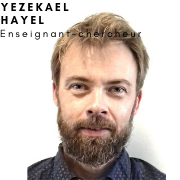[Portrait] Yezekael HAYEL, Researcher at the LIA and Director of the Doctoral School Agrosciences and Sciences

1- What is your research about?
My research interests focus on the optimisation of complex systems, particularly systems with particular network structures. My work is at the frontier of computer science and applied mathematics, and this comes naturally from my multidisciplinary academic background in mathematics and computer science. Complex systems are used to model many phenomena in communication network computing, in the study of opinion dynamics in social networks, in biological systems and in artificial intelligence algorithms.
2- What is your scientific news?
My recent scientific activities are dominated by my appointment as director of the AgroSciences & Sciences doctoral school at the start of the last academic year. The multidisciplinary nature of my research activities is also very present in this doctoral school. Indeed, its scientific fields range from biology to STAPS, including computer science, mathematics and agronomic sciences. Moreover, this ED will have an important role in the recent IMPLANTEUS university research school, which was awarded in the second wave of ANR calls.
In terms of scientific news, one of my recent articles " modelling the evolution of opinions "This article was published in the CNRS journal. This article is the result of a collaboration with the Centre de Recherche en Automatisme de Nancy.
3- Why did you choose to work in academic research?
University research must be very creative, even when it is part of an industrial project. You have to constantly innovate, come up with new ideas and above all be curious. For all these reasons, I wanted to continue my thesis work in university research. I have always liked to share my knowledge and exchange with students (I have always given courses even during my 3 years of doctoral thesis), I chose university research rather than institute research.
4- What advice would you give to students who want to do research?
My main advice is not to get discouraged. It is a very interesting job because you have to be always alert and curious, but it can also be discouraging, for example when the results do not come as quickly as expected. So you have to keep faith in your scientific creativity, persevere when you have to, but also question yourself at other times. This questioning will help you to bounce back, to redirect research activities and to continue to be curious about science.
5- Which object or image from your research best illustrates you?
This image illustrates a course I taught at New York University during my CRCT. This experience was very rewarding professionally and personally and I encourage all researchers/future researchers to travel and continue to learn throughout their careers.

Updated on 26 March 2023